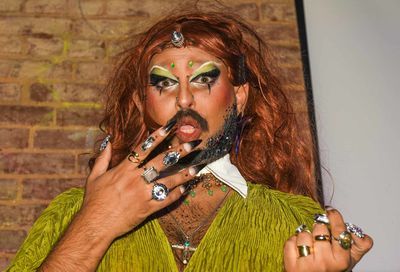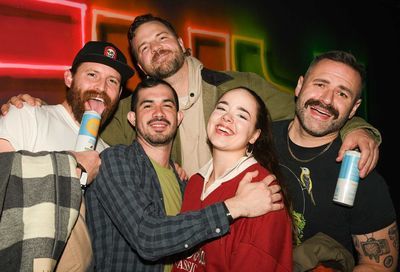Man Power
Glenn Close and Janet McTeer give Oscar-worthy performances in the gender-bending Albert Nobbs, so why isn't the film any good?

Albert Nobbs: Glen Close (left) and McTeer
Albert Nobbs should work. Hell, it already did work on stage thirty years ago when Glenn Close raked in off-Broadway acclaim and first aspired to put the story on film, so why not again? Close is a brilliant actress, working with a familiar role in a familiar medium. Shouldn’t that enough to get Nobbs good?
Guess not.


Starring
Glenn Close,
Janet McTeer
Rated R
113 Minutes
Opens Friday
E Street Cinema
Close plays a “kind little man” employed as a waiter in a Dublin hotel. Almost immediately, Close slips into this repressed, waxen eccentric as easily as she wears a pair of prosthetic ears. Her Nobbs, in what can only be called a fit of Very Serious Acting, is a timid servant with eyes like a wounded animal. There’s trauma projected through them, for what reason we don’t yet know. Then, courtesy a few seconds of panic encouraged by a hired painter named Hubert Page (Janet McTeer), all those pieces fit snug: Nobbs is a she hiding as a he.
Page is doing the same, as we soon find out, but differently from Nobbs in every way imaginable. (Just saying: They’d make a killer Odd Couple remake.) Page is bawdy and flirtatious, married and running her own business, firmly at ease with her identity and attitude. Nobbs shirks from everything, rarely even holding eye contact with others.
This conceit — women masquerading as men in 19th-century Ireland — sounds compelling, but tempts director Rodrigo Garcia with an awful lot of issues. In 113 minutes, he crams poverty issues, class tension, dreams of America, an outbreak of scarlet fever, drunken cons, and some rotten medical attention into Nobbs, seemingly to remind us again and again that life can be unbelievably shitty. Weighed down by what must’ve been a penny-pincher of a budget, that reality only flickers inside the hotel, where Dublin’s rich and poor are thrust into one another. When Garcia’s camera moves outdoors, flimsy period effects echo the film’s theatrical history in a way that’s both distracting and cheap. (Hello, dramatic snowfall!)
So rather than depict a rich, melodramatic atmosphere, Garcia’s tour of Irish misfortune only amplifies the self-effacing notes within Close’s performance. Lost are her subtle flourishes, how her dull monotone and stiff gait work weave a peculiar charm onto Nobbs, her budding friendship with Page, and her attempts to woo Helen Dawes (Mia Wasikowska).
Masterpiece Theater rip-offs aside, Nobbs presents some worthy questions about gender. Should Nobbs be considered a woman, despite her clear discomfort in that role? Can a loving marriage exist on a foundation of deceit? Did Nobbs do the right thing by sacrificing self for security? To Garcia’s credit — as well as Close’s, who wrote the script with Booker Prize-winning author John Banville — none of these questions are outright answered as much as they’re thoughtfully considered.
That, plus McTeer work’s in a role that ultimately outshines Close’s, should be enough to make Nobbs work. It’s got intrigue, doesn’t overextend past its genre, and features two spectacular performances that landed Oscar nominations. So, how does it manage to still be so damn boring? We’re talking about cross-dressing in Dublin, complete with bowler hats, aristocratic dinner parties, and high-rise collars! Save for McTeer’s Page, though, there’s barely a whiff of flavor in this wallowing pit of miasma.
In the end, these failures fall on the character of Nobbs. She wants to mimic Page’s life, but won’t remember her real name or address the identity she abandoned. She wants to marry Dawes, but never gives reason or feeling to that love. She yearns to buy into a fantasy lifestyle outside her emotional means, but never stops to consider why. You want to know why Albert Nobbs is no good? It, like its title character, is so caught up in its own drama, it never bothers to fill in the blanks.
Support Metro Weekly’s Journalism
These are challenging times for news organizations. And yet it’s crucial we stay active and provide vital resources and information to both our local readers and the world. So won’t you please take a moment and consider supporting Metro Weekly with a membership? For as little as $5 a month, you can help ensure Metro Weekly magazine and MetroWeekly.com remain free, viable resources as we provide the best, most diverse, culturally-resonant LGBTQ coverage in both the D.C. region and around the world. Memberships come with exclusive perks and discounts, your own personal digital delivery of each week’s magazine (and an archive), access to our Member's Lounge when it launches this fall, and exclusive members-only items like Metro Weekly Membership Mugs and Tote Bags! Check out all our membership levels here and please join us today!
























